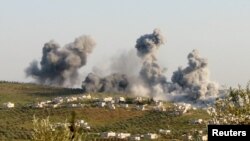Human Rights Watch said Tuesday that its investigations into attacks by Syrian government forces last month in Idlib province "strongly suggest" the military dropped barrel bombs with toxic chemicals.
The group said that based on reports from witnesses as well as audio and video from attack sites that there were strong indications of chemical attacks at three sites, while three others needed further investigation. The attacks all took place in or near the city of Idlib in areas controlled by opposition fighters, according to Human Rights Watch.
"Syrian authorities appear once again to have shown complete disregard for human suffering by violating the global prohibition against chemical warfare," Human Rights Watch Middle East and North Africa Director Nadim Houry said. "The U.N. Security Council and countries that are members of the Chemical Weapons Convention need to respond strongly."
Multiple chemical attacks have been confirmed in Syria during its four-year civil war, including what an international chemical weapons watchdog said were repeated and systematic uses of chlorine gas.
Human Rights Watch said Tuesday that rescue workers and doctors reported a chlorine smell at the attack sites last month, but that "it was not possible to conclusively determine what toxic chemicals were used."
The U.N. Security Council adopted a resolution in March condemning the use of chemical weapons in Syria and calling for those responsible for chemical attacks to be held accountable. It also reiterated — as in a 2013 resolution — that no party in Syria should develop or use chemical arms.




